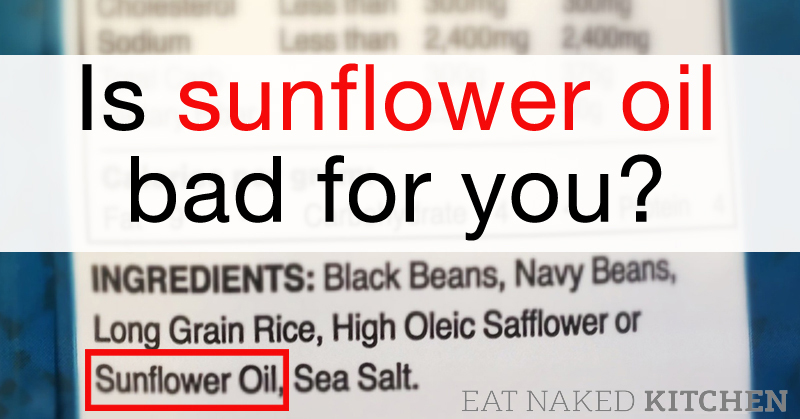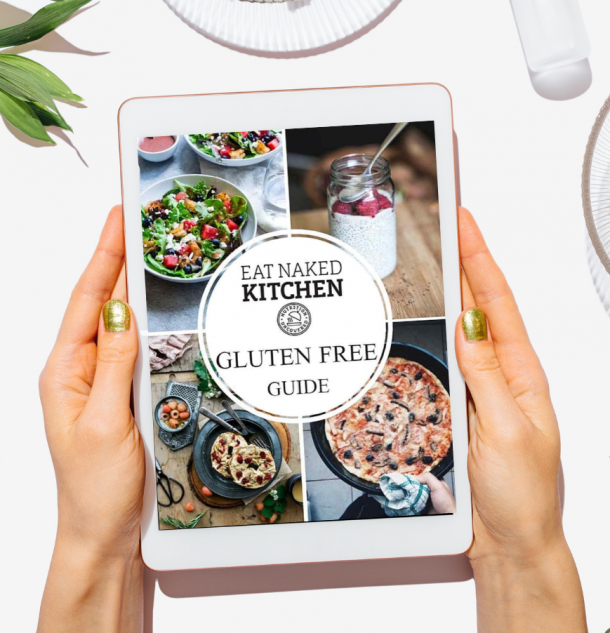Dear Eat Naked, is “sunflower oil” bad for you? If I ever buy packaged food items, I consistently examine the ingredients. I bought these plantain chips that have salt and sunflower oil. Is that terrible? – Rosanna A.
The short answer? Avoid the sunflower oil in packaged foods – even the “organic” and “natural” and “healthy” options.
Why? Well, that takes a little more explanation. Here is the bigger picture.
There is no naturally-occurring fat (as in: not artificially and chemically altered, or over-processed) that is “good” or “bad” for you in and of itself. All fats, no matter their origin (animal or vegetable) or structure (saturated or unsaturated), have important roles in the human body.
The key considerations for fats are two-fold:
(1) how was it processed? and
(2) how does it fit in the broader context of the diet?
How was it processed?
If a fat or oil – particularly a more structurally unstable oil (as any unsaturated oil will be, by definition) – has been heated, bleached, deodorized, or altered in any way that damages the integrity of the fat (turns it rancid) – then it is extremely inflammatory and toxic to the body and best avoided. The most life-giving, organic oil can be rendered toxic very quickly through improper processing, storage and use.
How do you know how an oil is processed? Well, it’s a little more challenging but in the case of sunflower oil we know that it’s a very unstable oil, being mostly polyunsaturated. For the nutrition nerds out there, here’s a breakdown of the fatty acid content:
Fatty acid profile of sunflower oil (source)
Palmitic acid (saturated): 4–9%
Stearic acid (saturated): 1–7%
Oleic acid (monounsaturated omega-9): 14–40%
Linoleic acid (polyunsaturated omega-6): 48–74%
We also can assume that if it’s been used in a packaged good, it has more than likely been exposed to high heats and significant damage from the processing. Which means we want to avoid any packaged food that has this ingredient unless it is a raw food and you’re aware of the quality of the sunflower oil they used to begin with. If it’s in a raw food and you know the sunflower oil is of good quality and was cold pressed, this brings us to the next question:
How does it fit into the broader context of the diet?
Assuming the oil is completely unprocessed (i.e., cold pressed, stored in a dark container to prevent light damage – yes, these oils are that delicate) and pure, then we need to look at its broader context in the diet. This is a little trickier to do because it varies depending on what you typically eat. In the case of vegetable oils, most of us get far too many of them, not too few.
Most vegetable oils are high in Omega 6 fatty acids (sunflower oil is no exception as you can see from the table above). Historically, our diets had a ratio of 1:1 Omega 3 to Omega 6. The optimal ratio for human health is anywhere from 1:1 to 1:3. In today’s diet, we have anywhere from 1:15 to 1:30—wildly skewed to far too many Omega 6s.
And so, in most cases, opting out of a food that has added omega-6 rich vegetable oils is a good idea. By this criteria, you’d still want to pass on the packaged food with added sunflower oil, regardless of its quality and processing.
Is there ever a time for consuming vegetable oils? There can be, but that’s a topic for another day and another post…




Hi thanks for the article. What about cooking with sunflower oil? I love making truffle popcorn and the latest truffle oil I found was a sunflower oil. If sunflower oil is unsafe for making popcorn. What oils are best? thanks!
@christi – I wouldn’t use sunflower oil for cooking at all – it’s too delicate. Check out this post: https://www.eatnakedkitchen.com/eatnaked/2011/04/12/smokin-hot-or-unsafe-is-cooking-with-grape-seed-oil-a-good-idea/ for more on why. We use either good old fashioned butter, ghee or coconut oil for making popcorn. (Ghee would have the least impact on flavor in your case)
How can you pop corn in butter? What? It is the most delicate of all. Use olive oil it complements in flavor (has a buttery flavor) corn wonderfully. Second is coconut oil then add your own butter.
Even better than butter is ghee, but butter is a saturated fat and quite stable. Far more so than olive oil.
What about sunflower oil that is in probiotic drops? The dose is 3 drops per day in for example; gerber soothe probiotic drops.
The question is really about how it was processed up to that point – I personally wouldn’t feel confident that it was good quality oil that hadn’t been overprocessed.
Thanks! Should I ask the company? Would you trust their answer?
You can try… and just use your instincts. It’s always hard to know, but how they answer will tell you a lot! (read between the lines!)
Any probiotics that are for toddlers/infants should be refrigerated and usually come in an easily absorbable powder form that can be mixed into milk or juice. If it doesn’t need to stay cold, you are losing the live cultures!
What about sunflower lecithin? Is that the same as the oil. I use a hexane free brand, but I’m not sure if that matters if the oil for it has been heated to a non optimal temperature or how they store it etc.
Sunflower lecithin is different from sunflower oil. It is sometimes made from dehydrating the sunflower seeds so it’s possible the temperature was low. Depends on the source/company.
I would add that that it’s good to look deeper into probiotic supplements in the same way that people are looking into these vegetable oils. Many probiotic pills or drops do not work at all. I would look into raw fermented foods such as sauerkraut, kim-chi and kvass(fermented beet drink that is growing in popularity). They are packed full of live, active probiotics and have a greater impact because they take longer to be broken down by our digestive system- they stay in your system longer so they can really do their thing.
To me sun flower oil is good for me because it help reducing blood pressure, and is good too for cooking or frying things like fish, yam, meat and so on and it improve my health standard or status
I assume it is just labeled
As sunflower oil on packaging and not any other name? I am beginning to believe my son has an intolerance or allergy to it bc every time he eats something with sunflower oils labeled he gets diaharrea in an hour or so after eating…
Are there common food brands I need to avoid?
As far as i know, it’s labeled as sunflower oil. I’m not aware of any other names for it, but honestly anything is possible with the food industry!
Hey there, I think your blog might be having browser compatibility issues.
When I look at your website in Chrome, it looks fine but when opening in Internet Explorer, it has some overlapping.
I just wanted to give you a quick heads up! Other then that, terrific blog!
Hi, I’ve used Spectrum’s organic high heat expelled press refined for high heat oil.
I’ve used it in salads and cooking.
According to your article, essentially, this is not a good thing to to do???
I just want to make sure I understanding the bottom line of its message.
I’ve read an article that the only good oils for human consumption are olive & coconut- period.
http://www.thankyourbody.com/vegetable-oils/
Should I go throw out my sunflower,sesame oils???
You don’t need to throw them out, just don’t use them with heat. I use sesame oil all the time in dressings and sauces, but NEVER to cook with.
what oil would you pop popcorn in ??
Thanks ,
We use coconut oil or ghee.
Excellent Blog. I learned a lot! Can sunflower be used for the body as a lotion?
I’ve never tried it but I don’t see why not.
I’ve used different types of oil for cooking. My favorite is by far olive oil, but it doesn’t go with all recipes. So I use coconut oil and it’s really nice. Sometimes, but rarely, I use cold pressed sunflower oil.
What oil is good for roasting vegtables Like potato wedges at 450 degrees?
Coconut oil, duck fat are my two favorites. Also good old fashioned lard (bacon grease) tolerates high temperatures well and tastes delicious. Make sure to source it from pasture-raised pigs.
Olive oil is yhe best. But sun flower is rich in vitamin E.
Don’t think you know that the sunflower oil used to fry crisps is’t regular sunflower oil. It’s actually hi-oleic sunflower oil with a very different breakdown of fatty acids than your article states.
hi-oleic sunflower oil is higher in mono-unsaturated fats, but that doesn’t make it better to cook with. only truly stable fats such as coconut oil, ghee, an animal fats should be used for high temperature cooking.
I love what you guys are usually up too. This sort of clever work and coverage!
Keep up the great works guys I’ve you guys to blogroll.
Nice article.Thanks for sharing your information